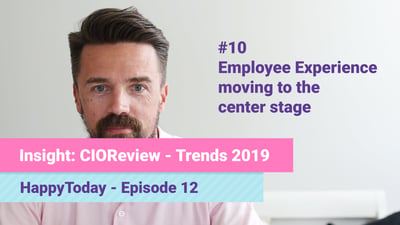CIO Interview: John Sullivan, Avanti West Coast
In this episode Pasi goes and meets John Sullivan, CIO and Project Director at Avanti West Coast (former Virgin Trains). We talk about the importance of employee and customer experience to the business, how traditional KPIs do not matter, and how trust and transparency are the key to succeeding with service experience data.
Related content

26.06.2019
Top ITSM Trends to Watch in 2019 by CIOReview.com
Pasi gives his take on a recent CIOReview.com article on Top Service Management Trends to Watch in 2019. Let's give a ...
Read more >
7 minute read
30.06.2017
Tips to get started on your journey to Employee Experience excellence
We know employee and customer experience is important to you, we hear customers and friends tell us about their huge ...
Read more >
